
Introduction:
They’re a lot of us out here who are willing to make donations to our favorite charity. Even if it’s a one-time thing or an occasional basis thing, we feel good knowing that we can make some kind of difference by donating a little bit of money to someone in need. However, scammers are skilled at the art of persuading people to bring out the kindness in themselves. And it’s for all the wrong reasons. What we’ll be talking about today, are online charity scams.
This is yet one of a whole handful of opportunities that scammers are taking on as a way to steal as much money as possible from unsuspecting victims. It is important that we know how to spot these scams from a mile away, and be able to protect ourselves. The last thing that we want is more people falling victim to these type of scammers. Especially the older, or even young people who may not be able to distinguish the real deals from the fake.
How Real Charities Work:
Charity donations work in a lot of ways. One of the more common ways for people to donate, is by donating some money in a jar. Some major charities even offer you the opportunity to donate online. Some have often utilized popular online platforms like “GoFundMe”, to donate to someone during their time in need. The donation is initiated by you and only you.
And, you can donate as much as you wish. There might be a charitable organization that is near and dear to your heart, and you might often donate to them. Either way, you’re able to do it securely and safe, whether it online, or in person. Plus, most of the charities are U.S.-based (and they’ll have the information to prove it).-
How Charity Scams Work:
Scammers will often attempt to contact you thru the Internet, or by telephone. The scammer will claim to be a representative of a charitable organization.
Next what they’ll do is tell you a fabricated story, of some unfortunate incident happening outside of the United States. One of their “go-to” incidents are natural disasters (i.e: floods, fires, earthquakes, cyclones, etc.). Their goal is to tell you a sad enough story to get you to become more compassionate, and consider the idea of donating.
Also, scammers who claim to be from charitable organizations may also have “boots on the ground” for lack of a better term. Which means they’ll have someone who may be scamming people in person. So it’s important to know whether or not they’re legit, by taking necessary precautions to ensure that you are protecting yourself from being their next victim.
What To Watch Out For:
To better protect yourself, we’ve outlined these steps that you need to take, so you won’t fall for the bait that the scammers lay out there. As mentioned, these scammers will employ every possible method that is designed to meet their end goal (which is stealing as much money from you as possible, or stealing your identity). Here are some things to keep an eye out for, so you can determine if a charity is real or fake:
You’re unfamiliar with the name: You may have heard of some of the commonly known charity groups like the “Red Cross”, or the “Wounded Warrior Project”. But if you haven’t heard of a charity, then that should raise a red flag. This is where you need to use the most extreme of caution. This is when you need to do further research.
Yes, they may have a website that looks legitimate, but that doesn’t mean anything. The important thing to do is look for a database that has a list of charities nationwide, or worldwide. These databases set strict guidelines for charities to follow in order to be listed. So see if it’s included in a database. If the name of the charity can’t be found, and move on. Don’t donate a single penny!
You’re being pressured into guilt about not giving: This is yet another psychological trick that scammers try to use. They try to shame you or make you feel guilty about not donating. A real charity won’t get defensive if you choose not to donate for the time being. They’re usually understanding. But if a so-called representative tries to guilt trip you into donating, then odds are you’re dealing with a scammer.
You’re asked to provide a cash donation, no checks: Most scammers will want cash for these “donations” and not checks. Checks will be hard to cash if you’re a fake organization. Plus, a checking account can also be traced to the scammer themselves. So why cash? They will less likely be traced, or tracked down. Likewise, if asked online, they’ll likely ask for your bank account information, or credit card information. Either way, don’t give it out to charities that you are not familiar with (unless you confirm that they are legitimate).
How To Protect Yourself:
One of the no-brainer things to you can do to protect yourself, is to never give out any bank account, credit card, or any other information that is tied to your finances online, or over the phone. Likewise, you should not give out any information that is associated with your identity. As mentioned, you also should do your due diligence to see if this unfamiliar charity is actually legitimate. Once again, find databases where you can find a list of charities to see if they pass a strict set of guidelines to be listed. If they’re not listed, don’t give out any money.
If approached on the street, do not be afraid to ask for any identification. If things seem off, do not give any money. It’s that simple. Additionally, you can also ask for information about the charity itself. When was it started? Where it is based? What is the address? How will the donation proceeds be utilized? If they refuse to answer these questions or get defensive, end the discussion immediately!

My Final Conclusion:
With most of us being honest and compassionate people, we tend to want to donate to our favorite charities as our way to give back to those in need. However, scammers are taking advantage of people each day, and making off with a lot of money in the process. Do not become a scammer’s next victim. Learn how to spot a fake charity scam using the precautionary measures explained above, and protect yourself by any means necessary. Point blank, end of discussion..
So, do you have any experience with being involved in an Online Charity scam? Do you have any questions concerning this scam review? If so, please leave your comments or questions at the bottom of this post, and I will be more than happy to get back to you. Thanks again for checking out my post, and good luck with your success online..
Were you looking for my top, legit work online recommendation instead?
Click here To Read My # 1 Recommendation!
Also, if you enjoyed reading and educating yourself on Online Charity scams, please don’t limit yourself. Feel free to read and learn “all about” a different, online scam/scheme review like:
“All About” Online Dating Scams
“All About” Student Loan Scams
“All About” Financial Aid Scams
“All About” Driving Violation Ticketing Scams
And Much More..



